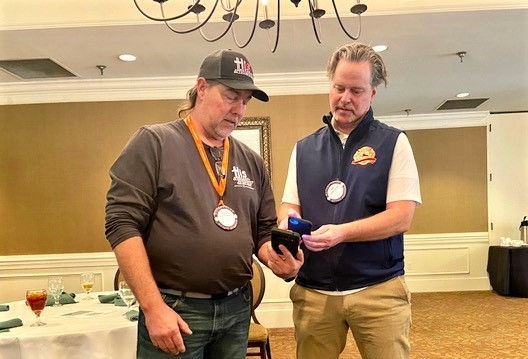Jeff Devlin has pretty much seen it all and done it all at Rural Metro Fire. He is in his 32nd year with Knox County’s emergency services provider, and, in his position as assistant chief of operations, he runs the day-to-day operations of what he said “is the largest private fire department in the world.”
With its 18 stations and 200 employees, Rural Metro’s footprint map of the area it covers in Knox County dwarfs the area of the city of Knoxville that it does not cover. Rural Metro’s huge area is home to approximately 264,000 county residents, according to the 2020 census, and it’s still growing.
Yesterday, Devlin, 52, spoke to the Rotary Club of Farragut at Fox Den Country Club. He recently became a member of the club. He does more than just work in Farragut at Station 41 headquarters on Campbell Station Road. He lives in Farragut and is on the town of Farragut’s Board of Zoning Appeals and the Parks and Athletic Council.
He had a lot to cover, and members peppered him with a lot of questions. One question had to do with how much it costs non-subscribers when their house catches fire. “First thing, our men and women on the fire engines do not know who is a member and who is not, so when the alarm comes in they are going to the fire,” he said. He said an approximate cost is $1,100 per truck per hour, and if it’s a bad fire that takes a few hours to knock down, a homeowner is looking at something like a $20,000 bill.
A residential subscription for Rural Metro fire coverage is $750 a year. The company receives no tax dollars from Knox County and operates off its subscription fees only. If you live in the city of Knoxville, fire coverage is part of the tax bills. “Basically, our subscription customers are paying for the non-subscribers,” he added.
Rural Metro is now helping manage and staff Knox County Rescue, and the two work together on different types of rescues, such as the recent trench wall collapse incident at a Powell construction site.
“More growth demands more services, and we’re now having, on average, a serious fire every other day to respond to,” he said. “And because of the way homes are built today and the furniture such as couches, the fires burn faster and are hotter.”
Last year Rural Metro Fire, as a first responder, rolled out to answer 17,238 calls and 60% of those were medical-related calls. They do not charge for those medical calls. If an AMR ambulance is needed, the families do have to pay for that service.
Devlin added that 70% to 80% of Rural Metro Fire costs are labor. A firefighter just out of the training academy starts at $37,000 a year. “Plus, we invest a lot of time and money into training them,” he said. “Covid hit us hard. Our responders, EMTs and paramedics were wearing masks and gloves and a lot of them got Covid. Some quit. The pressure was too great. We struggle now to recruit new firefighters like all of the agencies. We also spent lots of resources on continually testing our folks for Covid.”
And speaking of training, Rural Metro is in the process of building out a new sustainable regional fire training center on 11 acres in the Eastbridge Business Park off Rutledge Pike. “It’s a five-year project that we hope to be using in 2023,” he said. The property is owned by Knox County, and Rural Metro has a 25-year lease agreement with the Knox County Development Corp.
To explore membership in the Rotary Club of Farragut, call 865-659-3562. Farragut Rotary meets each Wednesday at 12:15 p.m. at Fox Den Country Club. Tom King, a past president of Farragut Rotary, has served at newspapers in Georgia, Tennessee, Texas and California and has been the editor of two newspapers.

